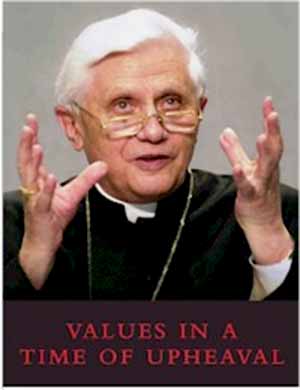 |
Consequences of Vatican II
A Contradictory Definition of Relativism
Dale Vree
First published in The New Oxford Review, November 2007,
under the title Definitely Not a Political Theorist
Then Joseph Cardinal Ratzinger in his book Values in a Time of Upheaval (Crossroad Publishing Co./ Ignatius Press, 2006) plays the political theorist. This book is not part of the Church’s Magisterium.

Contradictions on the same page... |
We have commented on Cardinal Ratzinger’s phrase the “dictatorship of relativism” many times. And we’ll do so again. A “dictatorship of relativism” doesn’t compute. There can be a dictatorship of absolutism. There can be an anarchy of relativism, a democracy of relativism, a liberty of relativism. The destruction of Christian morality in the West is not the result of any dictator. It’s the result of a “democracy, liberty, and freedom of relativism.” Most democratic people support moral relativism or acquiesce to it.
Or as Donald DeMarco said in the National Catholic Register (Aug. 6-12, 2006), Cardinal Ratzinger “has given some popular currency to the phrase 'the dictatorship relativism.'The true relativist ... would have nothing to dictate to anyone.” Touché.
In Cardinal Ratzinger’s Values in a Time of Upheaval, he muddies up his phrase; indeed, he reverses his position. He says, “The modem concept of democracy seems indissolubly linked to that of relativism.” Well, well! But then he backtracks: “This means that a basic element of truth, namely, ethical truth, is indispensable to democracy.” But then he backtracks again: “We do not want the State to impose one particular idea of the good on us. ... Truth is controversial, and the attempt to impose on all persons what one part of the citizenry holds to be true looks like enslavement of people’s consciences.” And he says this on the same page!
Yes, we know: Some of our readers feel that the Pope is above all criticism; he cannot make a mistake, even in his previous writings. But what he has written here is contradictory and inscrutable.
Ratzinger says, “The relativists ...[are] flirting with totalitarianism even though they seek to establish the primacy of freedom ...” Huh?
So, what is he saying? “The State is not itself the source of truth and morality.... Accordingly, the State must receive from outside itself the essential measure of knowledge and truth with regard to that which is good. ... The Church remains outside’ the State. ... The Church must exert itself with all its vigor so that in it there may shine forth moral truth ...”
Then he says, “Conscience is the highest norm [italics in original] and ... and one must follow it even against authority. When authority - in this case the Church’s Magisterium - speaks on matters of morality, it supplies the material that helps the conscience form its own judgment, but ultimately it is only conscience that has the last word.”
So the Church’s Magisterium will not “exert itself with all its vigor,” because “conscience has the last word.” Indeed, Ratzinger says that “one must follow the erring conscience.” Does the Church support relativism too? Pope John Paul II said in his Encyclical Veritatis Splendor, “Conscience is not an infallible judge” (n. 62; italics in original).
What happened to a rightly formed conscience? The Catechism says, “Personal conscience and reason should not be set in opposition to the moral law or the Magisterium of the Church” (n. 2039), and “One must therefore work to correct the errors of moral conscience” (n. 1793).

Posted November 27, 2007

Related Topics of Interest
 When Silence and Complacence Are Sins When Silence and Complacence Are Sins
 The Canonization of Wojtyla, the Moral-Free Pope The Canonization of Wojtyla, the Moral-Free Pope
 Inadmissable Concessions, Once Again Inadmissable Concessions, Once Again
 The Current Vatican Moral Relativism The Current Vatican Moral Relativism
 Canonization of Relativism Canonization of Relativism



|
Vatican II | Hot Topics | Home | Books | CDs | Search | Contact Us | Donate

© 2002-
Tradition in Action, Inc. All Rights Reserved
|
 |
|